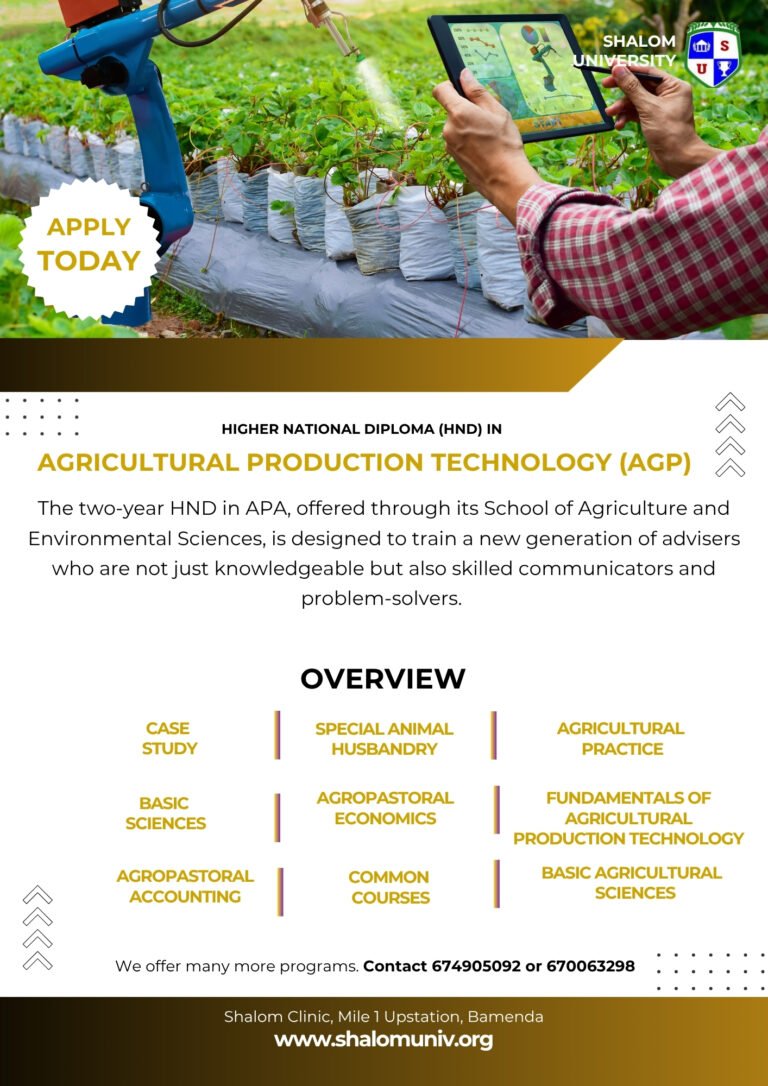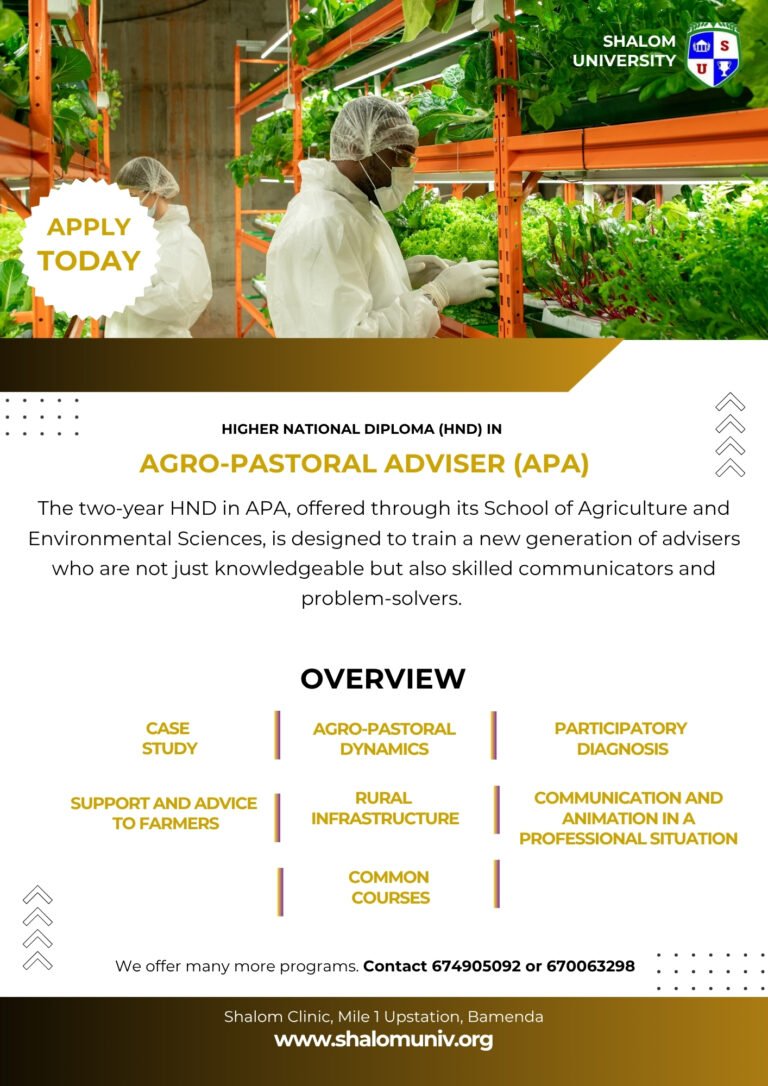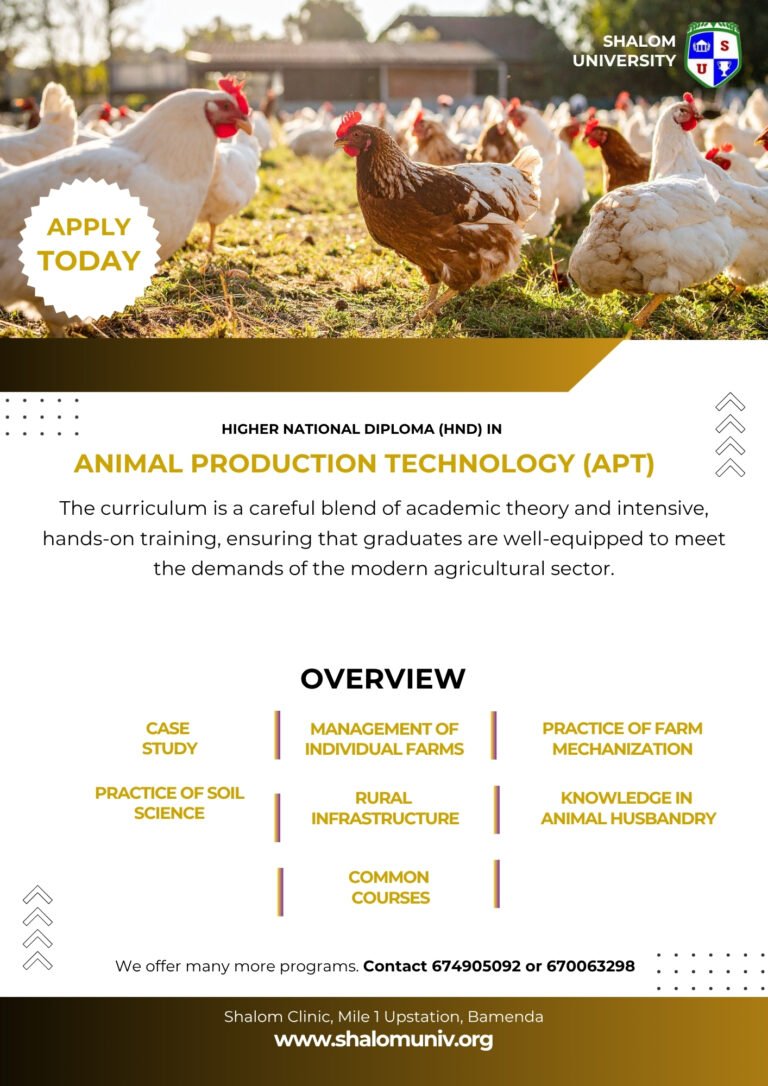In Cameroon, the agricultural sector is the engine of the economy, providing employment for the majority of the population and contributing significantly to national food security. The efficient and sustainable production of crops is therefore of paramount importance, requiring a new generation of skilled and innovative agricultural technologists. The HND in Crop Production Technology (CPT) at Shalom University in Bamenda is specifically designed to meet this demand, offering a practical and scientific program that prepares graduates to manage, optimize, and innovate crop production systems.
The curriculum at Shalom University is tailored to the Cameroonian context, blending core plant science principles with hands-on training in farm management, mechanization, soil science, and rural infrastructure. Graduates are prepared not only to work on existing farms but also to establish and manage their own crop production enterprises, contributing to sustainable agriculture and entrepreneurial growth.
The CPT Curriculum at Shalom University
The HND in Crop Production Technology program at Shalom University is structured around a set of core papers that provide a comprehensive and practical education in the field.
Paper: Case Study
The Case Study paper is a vital component that integrates all the theoretical knowledge and practical skills gained throughout the program. It challenges students to analyze complex scenarios within the crop production industry, from managing a pest infestation on a cocoa plantation to developing a sustainable business plan for a new vegetable farm. This is particularly relevant for crop technologists in Cameroon, who must navigate local challenges related to climate variability, pest and disease pressure, and market access.
The course trains students to:
- Analyze real-world crop production challenges: Based on a given case, students evaluate operational bottlenecks, pest and disease issues, or management inefficiencies faced by a farm in Cameroon.
- Identify critical issues and underlying causes: They pinpoint specific problems related to soil fertility, water management, pest control, or market access and explore the underlying factors.
- Propose evidence-based solutions: Students formulate practical recommendations based on crop science principles, soil management techniques, and farm management practices. For example, a case study might involve a maize farm facing declining yields and propose a new soil fertility management plan or an integrated pest management strategy.
- Defend their decisions: During formal presentations, students must justify their analysis and proposed solutions, demonstrating their critical thinking and communication skills, which are essential for effective farm management and stakeholder collaboration.
Paper: Practice of Farm Mechanization
In modern agriculture, mechanization is key to improving efficiency, productivity, and profitability. This paper provides students with the practical skills needed to operate and maintain farm machinery and equipment used in crop production.
The curriculum covers:
- Tractor and Implement Operation: Hands-on training with tractors and their various implements, such as plows, harrows, planters, and sprayers.
- Irrigation Systems: The use of different irrigation techniques and equipment for efficient water management, which is crucial in areas prone to drought or with limited rainfall.
- Post-Harvest Equipment: Operation and maintenance of machinery used for harvesting, drying, and processing crops.
- Basic Maintenance and Repair: Skills for performing basic maintenance and repair on farm machinery to minimize downtime and costs.
Paper: Management of Individual Plots
This paper focuses on the business and administrative aspects of running a crop production enterprise on an individual plot. It provides students with the managerial skills needed to make sound decisions, manage resources effectively, and ensure the profitability of their farms.
Key topics include:
- Farm Business Planning: Developing comprehensive business plans for different types of crop production, including financial projections, marketing strategies, and operational plans.
- Resource Management: Managing farm resources, including land, water, fertilizer, and labor, efficiently and sustainably.
- Record Keeping and Financial Management: Implementing effective record-keeping systems for production data, financial transactions, and inventory.
- Marketing and Sales: Strategies for marketing and selling crop products in local markets and to commercial buyers in Cameroon.
Paper: Practice of Soil Science
Soil is the foundation of crop production, and understanding its properties and management is crucial for achieving high yields and sustainable farming practices. This paper provides students with a foundational knowledge of soil composition, fertility, and management techniques.
Key areas of focus include:
- Soil Composition and Fertility: Understanding the different types of soil in Cameroon and their fertility, which affects crop growth.
- Soil Management Techniques: Methods for improving soil fertility, including the use of organic and inorganic fertilizers, crop rotation, and composting.
- Erosion Control: Strategies for preventing soil erosion, which is a significant problem in many parts of Cameroon.
- Soil and Water Conservation: Techniques for conserving soil moisture and managing water resources effectively.
Paper: Rural Infrastructure
This paper focuses on the planning, construction, and maintenance of the essential infrastructure required for crop production in rural settings. This is particularly relevant for students in Cameroon, where infrastructure development can be a significant challenge.
The curriculum covers:
- Irrigation Systems: Designing and constructing different types of irrigation systems, such as drip irrigation, sprinklers, and gravity-fed systems.
- Drainage Systems: Planning and implementing drainage systems to prevent waterlogging and soil erosion.
- Storage Facilities: Designing and constructing appropriate storage facilities for crops to minimize post-harvest losses.
- Farm Roads: Basic principles of constructing and maintaining farm roads for transport and access.
Paper: Knowledge in Crop Husbandry
This paper provides students with the core theoretical and practical knowledge of crop production, covering the breeding, nutrition, health, and management of different crop species.
Key topics include:
- Crop Nutrition and Fertilization: Understanding the nutritional requirements of different crops and how to apply fertilizers effectively.
- Crop Health and Pest Management: Principles of crop health, common pests and diseases affecting crops in Cameroon, and methods for integrated pest management.
- Plant Propagation: Techniques for propagating different crops, including seeds, cuttings, and tissue culture.
- Weed Management: Methods for controlling weeds, which compete with crops for nutrients and water.
- Post-Harvest Handling: Techniques for harvesting, handling, and storing crops to maintain quality and minimize losses.
Nurturing Cameroon’s Agricultural Future
Graduates of the HND in Crop Production Technology from Shalom University are well-prepared to contribute significantly to Cameroon’s agricultural sector. They can find opportunities as farm managers, crop technicians, extension agents, or establish their own crop production enterprises. Their proficiency in farm management, mechanization, soil science, and crop husbandry, coupled with an understanding of the local context, makes them highly sought-after candidates. The Case Study paper ensures that they are not just technically skilled but also adept at applying their knowledge to solve real-world challenges in crop production. By providing a comprehensive and contextually relevant education, Shalom University plays a significant role in nurturing the expertise crucial for driving sustainable crop production, ensuring food security, and supporting rural livelihoods in Cameroon.




